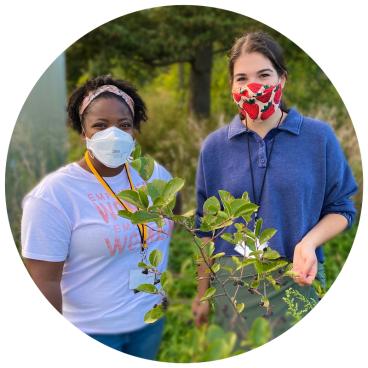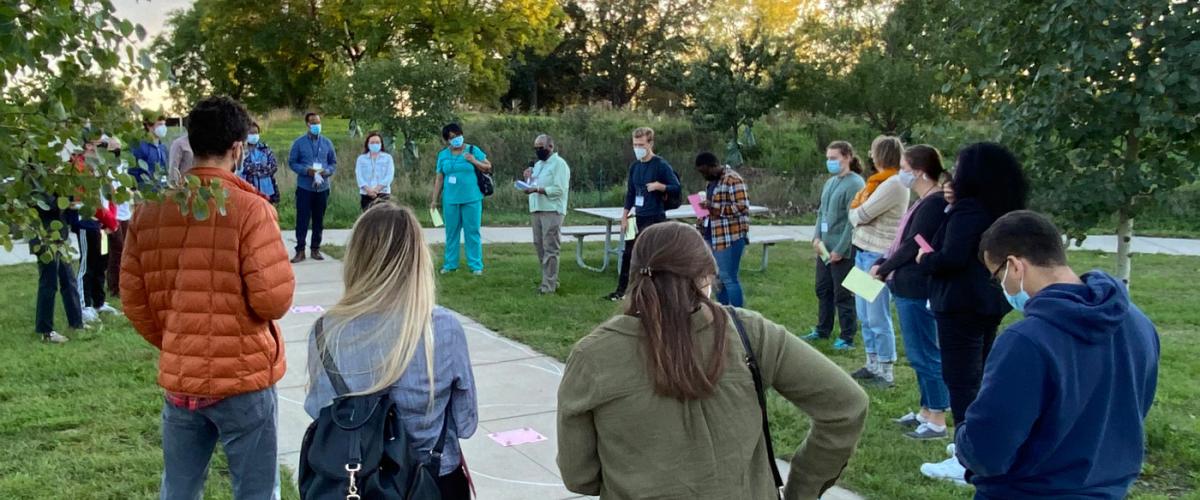Global Health in Local Contexts: International Partnerships for a Transnational Learning Experience
Global Health in Local Contexts students gathered at St. Paul's Frogtown Farm for their first class session.
For the first time this past fall, the Center for Global Health and Social Responsibility (CGHSR)’s Global Health in Local Contexts course included a unique opportunity for students to learn alongside peers in other countries.
In addition to the University of Minnesota (UMN) course participants, the class was made up of thirty students from parallel courses: Global Health in Local Contexts, Uganda and La santé dans les contextes locaux, Haiti. The course was offered in partnership with EqualHealth, a nonprofit organization in Uganda and Haiti.
Using virtual learning technology that has become accessible during the COVID-19 pandemic, the course allowed students from all three countries to experience global health from within their own local communities—and collectively, from across continents.
“This course provides an opportunity for the long and nourishing work of building transnational relationships built on solidarity and trust,” said Mike Westerhaus, MD, one of the course instructors at the University of Minnesota. “The large-scale social forces that perpetuate health inequities, such as racism, patriarchy, and colonialism, are sustained through transnational networks, flows, and connections. Thus, an effective response to such forces absolutely requires transnational relationships in order to create the world we want.”
Organized and coordinated by CGHSR, this course is an exciting cornerstone in the Center's growing educational portfolio alongside other courses such as India: Global Health, Globalization & Leadership and a new course on Global Health Ethics organized for the 2022 Public Health Institute.
A Transnational, Experiential Course
Back on Zoom, in mixtures of English, French, and Creole, students introduced themselves and described their backgrounds and interests in health.
Students joined the course from a variety of educational settings, including Mbarara University and Makerere University in Uganda, Université d’État d’Haïti and Université Notre Dame d'Haïti, in addition to the University of Minnesota. Students were from a mixture of health sciences programs, including medicine, nursing, public health, pharmacy, dentistry, and even speech and language therapy.
Students in each course attended site-specific classes and had site-specific coursework, and also participated in all-sites activities including discussion groups on WhatsApp and monthly all-sites classes on Zoom.

"I learned so much from my peers in Uganda and Haiti. Time learning with and from them are the invaluable moments that led me to sign up for this class—a new, more complex way to think about health," said Delaine Teabout Thomas, a School of Public Health student. "Location is such a powerful determinant of one's outlook. Simply because I live in Minneapolis, in this environment, there are revelations, truths, and complexity of the health experience that I am missing just by being who I am and where I am. Learning alongside someone else and gleaning from their wisdom changed me.”
“I'll never think about wellness or illness the same way again because of what my international peers shared,” Thomas said.
Responsible Global Health Education
In the era of the COVID-19 pandemic, many academic institutions are considering ways to engage in global health education in a more responsible, ethical manner.
Other global health education models involve international travel for students and trainees to experience health in a different cultural setting—but these models may be inequitable, especially as they can be expensive or cost-prohibitive for some students.
The transnational model of Global Health in Local Contexts introduces a new way to engage in global health education. Rather than spending large amounts of money—and jet fuel—on international travel, students can learn from peers in other countries and apply these global health principles to their own local experience.
While there were growing pains and complicated logistics to iron out in the first year of managing three parallel courses, the experience overall was satisfying to the majority of students.
Students were asked about their perspective of the course in an anonymous post-course evaluation. “I liked that we were all from different backgrounds, so there was a lot I learnt from my peers from other countries,” reported a student from the Uganda course. “People had these amazing perspectives about health, very brilliant ideas. Sharing was amazing in general.”
The fall 2022 Global Health in Local Contexts course application will open on April 14 to University of Minnesota students (if you'd like to be notified, sign up for our mailing list). Students in Haiti and Uganda can refer to EqualHealth’s website for details on the 2022 social medicine course.
